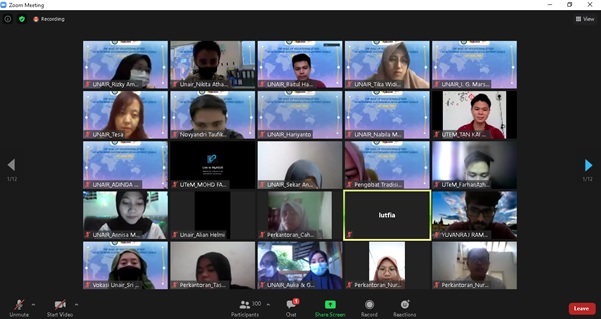UNAIR NEWS – To understand the role of vocational studies in Achieving Sustainable Development Goals, an event was held on Thursday, June 10, 2021, attended by 300 students of Universitas Airlangga and Universiti Teknik Malaysia Melaka. Vice Dean I of Faculty of Vocational Universitas Airlangga, Dr. Tika Widiastuti, S.E., M.Si., opened the event with a short speech, expressing her gratitude and hoping the future will be better for UNAIR and UTeM Vocational students.
Dr. Tika Widiastuti, S.E, M.Si., as the first speaker, also spoke about the role of vocational studies in the era of sustainable development goals. Vocational education is a higher education system that supports the mastery of applied skills.
“For vocational students, 60 percent of the learning program is practical experience in the industry, while 40 percent is mastery of applicable theories,” she said.
Vocational education is different from undergraduate education from academic programs. Students of vocational studies are given basic theory as well as practical experience. The faculty of Vocational Studies also has competent educators with professional certifications.
“Faculty of Vocational Studies’ students are expected to master the theory and be competent in their respective fields of expertise,” said Dr. Tika.
Dr. Tika said vocational education raises the awareness of business and industry practitioners to take greater responsibility towards industrial development. Therefore, vocational education must be developed to fill jobs in the industry.
“The goal of developing vocational education is to increase vocational education graduates working in many strategic industries, with a profile of graduates with high skills and knowledge,” she said.
Development in various countries, including in Indonesia, is aimed at forming qualified and competitive human resources. For this reason, vocational education plays an important role in improving the quality of human resources in the industrial sector.
“In Indonesia, the Ministry of Education and Culture has designed the Link and Match program, which aims to increase the relevance of vocational education to the needs of the professional world,” she said.
As the second Speaker, Dr. Anidah Bint Robani, Research coordinator for the Institute of Technology Management and Entrepreneurship, Universiti Teknik Malaysia Melaka, provided material on Higher Education and Sustainable Development Goals (SDGs) amid the Covid-19 Pandemic Challenges.
It is a developing concept, but it is apparent that achieving sustainability is socio-political and cannot be achieved solely by technology. It is accessible in a sense, but it is hard to achieve, very hard to understand.
“In general, sustainable development is a development that is oriented towards improving the quality of life without destroying the environment and resources for present and future generations,” Dr Anidah said.
Anidah explained that the SDGs 2030 agenda is the most transformative and ambitious plan ever made by the global community, with 17 goals, 169 targets, and 232 indicators that balance economic, social, and environmental pillars.
“From rural to urban sustainability to conservation and management of nature reserves, rebuilding the village economy through community-based ecotourism, local biological resources for the community economy,” she said.
Beyond the most direct impacts on poverty (SDG 1), food security (SDG 2), health (SDG 3), the economy, SDG 8, and multilateralism (SDG 17), Covid-19 also affects many other SDGs such as SDG 10 (Reducing Inequality).
“Countries and vulnerable population groups (including the elderly, people with preconditions, the homeless, low-skilled workers, and refugees) are not disproportionately affected by the short- and medium-term consequences of the COVID-19 crisis (United Nations, 2020). It is expected to lead to inequality, which hinders progress in achieving SDGs 10 (Reduction of Inequality),” she said (*)
Author: Moch Rachman Halim
Editor: Feri Fenoria





